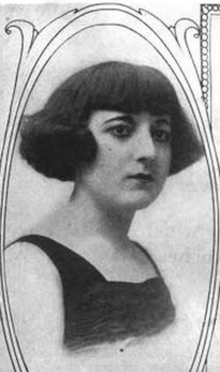Alice Frisca
Alice Frisca (March 7, 1900 — January 24, 1960) was the professional name of Alice Mayer, an American pianist.

Early life
Alice Mayer was from San Francisco, California,[1] the daughter of Benjamin Mayer and Eva Mayer. Her stage name was a reference to that city. As a young woman she won the MacDowell Prize from the California Federation of Music Clubs.[2] She was a student of Pierre Douillet,[3] Clarence Eddy, and Leopold Godowsky.[4]
Career
She made her Paris debut in 1920.[5] Frisca was honored with a medal for a concert she gave in 1921 in Paris, a benefit for French and Belgian artists in need after World War I.[6] "She has a conspicuously neat and fluent technique," noted critic Alfred Kalisch, writing in The Musical Times of her London debut in 1921, "and a touch of no little charm."[7] Her New York debut a few months later drew similar critical appreciation,[8] though the New-York Tribune scoffed that "Miss Frisca evidently mistakes force for brilliance," and said that she "more nearly resembled a noisy amateur than a professional pianist."[9]
Personal life
Alice Frisca married businessman Ralph Kirsch in New York, and left behind her performing career.[10] Her husband's nephew, Harold C. Schonberg, was the Pulitzer Prize-winning chief music critic at The New York Times from 1960 to 1980; he cited her as his first piano teacher and an important early influence on his understanding of music.[11] Alice Mayer Kirsch died in 1960, aged 59 years, while in Puerto Rico with her husband.[12]
References
- Walter Anthony, "Pianist of 17 Makes Her Debut A Big Success" San Francisco Chronicle (September 19, 1917): 8. via Newspapers.com

- "Pianist is Winner of Contest for Artists" San Francisco Chronicle (May 9, 1920): 3. via Newspapers.com

- "Alice Mayer Praised at Pianistic Debut" San Francisco Chronicle (September 23, 1917): 7. via Newspapers.com

- "Alice Mayer to Leave for Paris" Pacific Coast Musical Review (June 19, 1920): 9.
- "Alice Frisca Conquers Paris" Music News (December 24, 1920): 27.
- "Alice Frisca Honored For her Paris Concert in Aid of Artists" Musical America (February 13, 1921): 21.
- Alfred Kalisch, "London Concerts", The Musical Times (May 1, 1921): 340.
- "Alice Frisca's New York Debut" Pacific Coast Musical Review (November 19, 1921): 52.
- "Alice Frisca Makes New York Debut in Recital at Aeolian" New-York Tribune (October 7, 1921): 8. via Newspapers.com

- Harold C. Schonberg, Facing the Music (Simon & Schuster 1985): 15. ISBN 9780671605636
- Allan Kozinn, "Harold C. Schonberg, 87, Dies; Won Pulitzer Prize as Music Critic for The Times" New York Times (July 27, 2003).
- "Mrs. Ralph Kirsch" New York Times (January 27, 1960): 33.